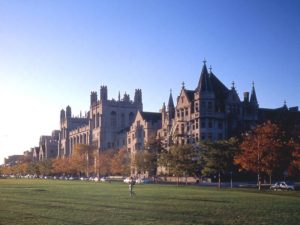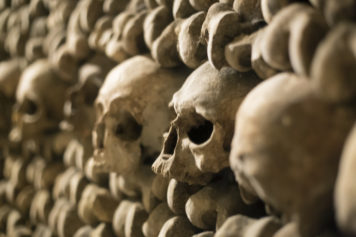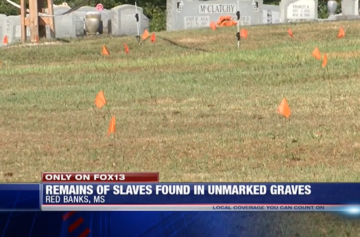
The University of Chicago was founded after an endowment by Stephen A. Douglas, who got rich off of the system of slavery. (image courtesy of Intellectual Takeout).
A new group at the University of Chicago is demanding reparations, pressing the school to pay its historical debt for the enslavement of Black people.
The group, called “Reparations at UChicago Working Group,” or RAUC, laid out its demands in a paper earlier this year, arguing that the university could do more for Black folk to atone for the atrocities committed against them during slavery. The paper emerged from a recent session at UChicago’s U.S. History Workshop on “Reparations and the Modern University,” according to the African-American Intellectual History Society, which later published it.
“This cannot be a question of what the university will do for Black communities,” the group wrote. “It must be a function of what Black communities demand as payment to forgive an unforgivable debt. Black people do not need a seat at the university’s reparations table — they need to own that table and have full control over how reparations are structured.”
In their paper, RAUC group members discussed the institution’s ties to slavery, highlighting everything from a multi-million dollar founding endowment made by slaveholder Stephen A. Douglas, to the “inhuman and disgraceful treatment” of enslaved African-Americans on his plantation in Washington County, Miss.
“Slavery soon provided [Douglas] with the financial security and economic power to donate 10 acres of land (valued at over $1.2 million in today’s dollars) to start UChicago in 1857,” the authors wrote. “This founding endowment, drenched in the blood of enslaved African-Americans, was leveraged by the University of Chicago to borrow more than $6 million in today’s terms to build its Gothic campus, its institutional structures, its organizational framework, its vast donor network and an additional $4 million endowment before 1881.
“In short, the University of Chicago owes it entire presence to its past with slavery,” they added.
The group goes on to advocate for the creation of an African-American Studies department at the university, highlighting the steps other institutions have taken to address its slave past by making crucial changes at their respective schools.
“Establishing an African-American Studies department should be a no-brainer,” they said. “So, too, should be a concerted effort to recruit and develop faculty of color while [also] vigorously recruiting and mentoring underrepresented students to attend the university. But this should happen anyway. It’s not reparations.”
Lastly, the working group tore into the system of capitalism, calling it a “monstrosity,” and arguing that the U.S. must begin thinking “beyond the legal framework of “damages’ or the neo-liberal ordering of private property rights.”
“Reparations promise us a monumental re-birthing of America,” the authors concluded. “Like most births, this one will be painful. But the practice of reparations must continue until the world that slavery built is rolled up and a new order spread out in its place.”
“Until then, the University of Chicago must begin all of its conversations with the knowledge that it is party to a horrific crime that can never be fully rectified. But still it must try.”
The RAUC Working Group consists of: Ashley Finigan, a Ph.D. candidate in the Department of History and residential Fellow at the Center for the Study of Gender and Sexuality; Caine Jordan, a first-year Ph.D. student in the Department of History; Guy Emerson Mount, a Mellon Foundation Fellow and the coordinator of the U.S. History Workshop at the University of Chicago; and Kai Parker, a Ph.D. candidate in the Department of History, according to the AAIHS.
RAUC members nor officials at the University of Chicago responded to requests for comment.


